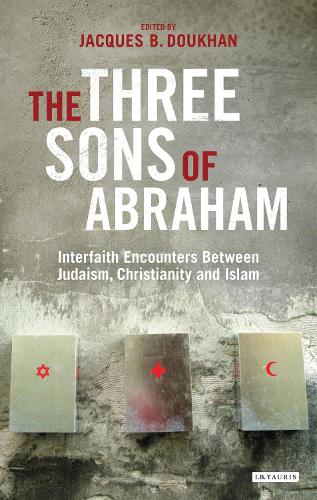
The Three Sons of Abraham: Interfaith Encounters Between Judaism, Christianity and Islam
(Hardback)
Publishing Details
The Three Sons of Abraham: Interfaith Encounters Between Judaism, Christianity and Islam
By (Author) Jacques B. Doukhan
Bloomsbury Publishing PLC
I.B. Tauris
18th December 2013
United Kingdom
Classifications
Tertiary Education
Non Fiction
201.5
Physical Properties
Hardback
256
Width 138mm, Height 216mm
440g
Description
Jews, Christians and Muslims all trace their history and spiritual raison d'etre to their common tribal ancestor, Abraham. Their religious identities are interrelated and even dependent on each other. Jesus lived as a Jew and Christianity was born in the heart of Judaism. Early Christianity was inherently Jewish, referring to the same scriptures-the Tanach, later called the "Old Testament"-and holding to the same messianic promises. Mohammed, the prophet of Islam, knew both Christianity and Judaism. The Qur'an contains material indebted to the Old Testament and Jewish tradition, as well as stories and teachings from the New Testament; and Mohammed himself met Jews and Christians alike during his lifetime. Furthermore, the three religions share many fundamental ideas and beliefs. They testify to the same memory of Abraham; value the same divine law; urge the same ideal of righteousness; and proclaim the same hope of peace for the earth and salvation for humankind. Despite this shared heritage, the three Abrahamic faiths have sometimes been more closely identified not for what they offer to save the world but for what they bring to destabilise it. It is one of the depressing paradoxes of religion- supposedly a force for good-that it is all too frequently the occasion for conflict instead of peace, generosity and better treatment of one's neighbor. The contributors to this volume start from the premise that there is a price to be paid by the "sons of Abraham": whether Jews, Muslims or Christians. And that is the cost of learning how to be brothers through mutual and attentive engagement. Mature interfaith discussion offers respect for a shared heritage while also recognising points of distinctiveness. This book explores what articulating such regardful difference, as well as commonality, might mean for the future of faith relations. Including provocative reflections by Elie Wiesel, Irving Greenberg, Hans Kung and others, the book makes a vital contribution to dialogue. In its searching analysis of issues of peace, justice, hope and forgiveness, it will engage all students and scholars of interfaith studies.
Reviews
'The interviews and reflections in this volume are nothing less than essential reading for anyone concerned about the challenges to and possibilities for greater peace between Christians, Muslims and Jews.' Gregory A. Barker, Senior Lecturer in Religious Studies, The University of Wales, Trinity Saint David 'Jews, Christians and Muslims have usually defined themselves against each other. This book dares to think differently - and to explore the implications of a different question. How can the three versions of the prophetic tradition that originates with Abraham be thought together - in complementary rather than competitive terms This sensitive, incisive yet always accessible volume addresses one of the great issues of our time, one from which the broader dialogue of religions and cultures can only benefit. In extending what is often referred to as the "Judaeo-Christian tradition" into the world of Islam the writers propose an admirably generous alternative to the destructive sibling rivalry which has so painfully driven the "Sons of Abraham" apart.' Michael Barnes, SJ, Professor of Interreligious Relations, Heythrop College, London 'This book has a vitality that comes out of living encounters between scholars from the three religious traditions. It usefully contains not only discussions of important texts, but interviews too with key participants about what dialogue means for them personally. The individual essays admirably carry out the aim of the book, that Jews, Christians and Muslims should "define themselves along with each other and not against each other. they should also run the risk of looking at each other's face". The Three Sons of Abraham can be warmly recommended not only to specialists, but to anyone who wants to enter into a subject that is so crucial for our time.' Richard Harries (Baron Harries of Pentregarth), formerly Professor of Divinity, Gresham College, London, and Bishop of Oxford (1987-2006)
Author Bio
Jacques B Doukhan is Professor of Hebrew and Old Testament Exegesis, and the Director of the Institute of Jewish-Christian Studies, at Andrews University, Berrien Springs, Michigan. His books include Hebrew for Theologians: A Textbook for the Study of Biblical Hebrew in Relation to Hebrew Thinking and Israel and the Church: Two Voices for the Same God.
